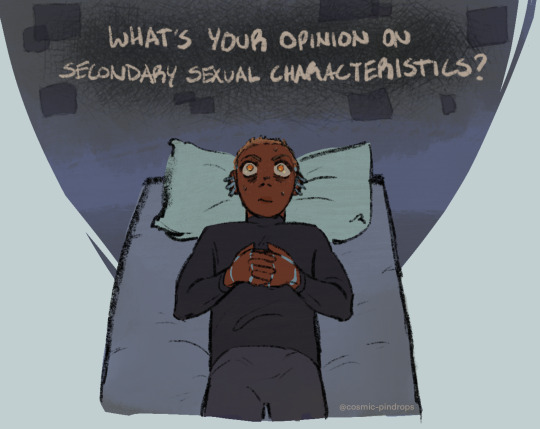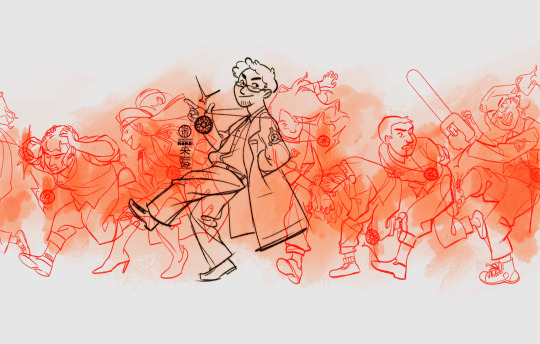#poor research
Text
We have a serious problem
Michael Laidlaw, MD: I'm a board-certified endocrinologist, practicing in private practice for the last 16 years. I've been studying and publishing in this area for the last 5 years, including peer reviewed journals such as Journal of of Clinical Endocrinology and Metabolism, and others. I also have a patient who is a detransitioner.
I think it's important to note that studies are shown that desistance, or growing out of this condition, of children by adulthood is very high. It's some 50-98%.
I want to be sure before I give someone a very powerful hormone like Insulin that they in fact have diabetes.
What about cancer? Before we give any powerful agents such as chemotherapeutics or surgeries, we certainly want to have physical evidence of this problem, such as biopsies or imaging.
Now, the gender affirmative therapy treatment proposed by WPATH gives very powerful hormones and surgeries on what basis? Where can we find the gender identity to be certain that these children will not desist by adulthood? Can we use imaging of the brain or blood tests, genetic testing, are there other biomarkers to ensure that we are correct? There is no such thing.
Julia Mason, MD: The Endocrine Society put out guidelines in 2017, and they were very careful in the guidelines. One, to point out that the evidence was of low and very low quality. And they also said in the guidelines that they have no idea how you identify which kids are trans and require this treatment.
And then the American Academy of Pediatrics the next year just leapt into that void and said, oh, oh, we'll tell you how you know which kids. You ask them.
Prior to 2018 I had maybe one trans patient. But then there was another one. And another one. And another one.
It wasn't until later that I started asking questions like, wait, every single kid I send to the gender clinic gets put on puberty blockers or cross-sex hormones. Just, it was happening immediately.
Patrick Hunter, MD: This affirmative model of care has spread wildly in the last 8 years. Now we have objective, unbiased systematic reviews. These systematic reviews tell us the evidence for youth transition is poor quality, and with very low certainty for benefit.
In JAMA Pediatrics, there was a study reported from Northwestern University in Chicago. Patients ranged in age from 13 to 24 years. The authors concluded that mastectomy was beneficial and should not be delayed in youth. What lead them to that conclusion? The finding that 3 months after surgery, the 36 patients were happy with their flat chests. They lost 9% of their surgical cases to follow-up. Nine percent. In 3 months.
It is absurd, meaningless to draw any conclusions after 3 months.
This paper is indicative of the quality of research we have in this field, published in our most prestigious journals.
We have a serious problem.
#gender ideology#queer theory#medical transition#desistance#detrans#sex trait modification#genderwang#detransition#trans identity#cross sex hormones#wrong sex hormones#puberty blockers#poor research#medical malpractice#medical scandal#medical corruption#endocrinology#low quality#ideological capture#ideological corruption#religion is a mental illness
910 notes
·
View notes
Text
I've seen Andrew Tate mentioned in a variety of posts on social media and referenced in comments and other such things, but I haven't actually looked up who he is. So far I've gotten the impression that he's either a celebrity, a politician, both or neither. He may or may not be a conspiracy theorist, homophobic, an idiot, transphobic, the president of florida or whatever the state representative is called or a cult leader. I am not gonna actually look him up because I think it's funny trying to figure out who he is based off of people saying "average andrew tate fan" under memes. Oh, another idea I had was that he might be the second coming of Trump.
0 notes
Text





Hear me out. Ratiorine AU where Aventurine is a mer captured by a group of researchers and Ratio is the scientist brought on board to teach him how to speak and access his intelligence levels.
#aventurine#hsr aventurine#dr ratio#hsr dr ratio#hsr#honkai star rail#star rail#ratiorine#raturine#aventio#mermaid au#mer!aventurine#see ok listen#aventurine is a very smart fish and while he cant speak Human#he can communicate by impressing the idea of something on someone#which is why his speech bubbles are all abstract things bc he communicates by sending the idea of what he wants to say to ppls brains#and hes clever hes our cunning merchant gambler#so while he was initially captured by some researchers to be studied#hes able to charm them up and get them on his side... thus allowing him to have more luxury than the average experiemental subject#ofc none of this reallt matters when the researchers wont let him go free but its the smalle victories...#eventually hell work his way up to freedom#ratio is the poor sap who was dragged into the study half way to teach aventuring how to Be Human basically#he accepts the proposition bc everyone deserves to have knowledge! even fish!#my art#comics#scribbles
537 notes
·
View notes
Text

tfw you just escaped corporate slavery & all your friends are dead so youre trying to cope by watching hour long video essays media like 2.0 said would help but the giant terrifying HubSys/Overseer/Ship AI keeps hinting that it wants to do experimental surgery on you
#poor three#murderbot#tmbd#the murderbot diaries#secunit three#secunit 3#asshole research transport#my art
352 notes
·
View notes
Text


#let poor child Shinobu sleep without nightmares#I meanwhile have been waking myself up around 2-3am every night with dreams about MY RESEARCH#my art#kochou shinobu#kocho shinobu#himejima gyomei#himejima gyoumei
498 notes
·
View notes
Text
Wait... Dream was born on August 12, 1999 and Dream was arrested in the Disc Finale on January 20, 2021 soo... wait, wait, wait, that means he was only 21 when he was imprisoned for life in a small lava covered box!... Did I do that math right? 21?! Man was barely able to drink legally in the United States and they gave him a life sentence in a boiling cell with nothing but lava, raw potatoes, a clock, and some books?!... oh my god...
#sorry.... I just... give me a minute to process... I mean I knew we were close in age but I guess I never really thought about it#sometimes I forget it happened all the way back in 2021 and just... wow.#and Tommy would have been 16 so getting his driver's license in most states... The age gap is like that of my siblings and huh...#my brother can be a real prick... its a weird thought to imagine him getting through in prison just for messing with us... damn...#dreblr#c!dream#this is fine#don't mind me researching for my lastest maddening project..... i can't stop thinking about Dream being Sam's project.......#I'd blame my job but... let's be honest the prison arc lives rent free in my brain lol XD#dsmp#dsmp dream#dream smp#dreamwastaken#no one does it like c!dream#prison arc#pandora's vault#dishing up lore#kinda? I guess...#lore thoughts#ouch... I'm older than c!dream was in prison now... poor baby... :'(
161 notes
·
View notes
Text
I don’t like when people ask how many books you plan to read/have read this year one because I think that’s a weird relationship to have to books and two because I think even reading a chapter or a portion of something is valuable. this is especially true with non-fiction but even with fiction I think any amount you read, even if you don’t read the entire thing, is not a failure or ‘incomplete’
#I read basically exclusively non fiction and every page I read is beneficial like I’m always learning something#like my relationship to reading is often extractive and utilitarian because of school and research#but that extractive process doesn’t require reading the whole text like 99.9% of the time#I’ve only read a third of Orientalism for example but like I have a good grasp of Said’s core arguments and concepts#and like part of how I finished authoritarian personality (a 1000 page book) was by skipping & skimming sections#like the whole is not always more valuable than its components#and also like ‘I read this book to complete it’ is not an insincere way to engage with a text but I feel like it’s limiting#if that’s your primary approach to reading. Like you read a book just to say you read it#& also more petty but I think that if your argument or thesis only works if people read 100% of your book then you’re doing a poor job#of getting your point across#again obviously it’s valuable to read and process whole complete texts not dismissing that but like#I don’t find a lot of inherent value in reading a book just to complete it u know
176 notes
·
View notes
Note
This is a weird ask that kind of relates to the headcanon of Vasco being a blood donor.
What's is Vasco's and Machete's blood type?
Maybe they like hook eachother up and die if they have incompatible blood types.
That's the way to go. Kinda romantic?
(A reference to a show that I hope someone here gets-)
This has no bearing whatsoever and I'm picking these based on nothing.
It would be ironic if Machete was O-, which is the universal donor type. It can be given to anyone without adverse effects, which makes it very useful in cases of trauma and emergency when the receiver's blood type is unknown. But he wouldn't be able to donate because of his chronic anemia and low weight. Type O- can only receive O- blood.
I'm tempted to give Vasco O+. Over 80% of human population is compatible with it so it's always in high demand, and I like to think as a regular donor his blood would have extremely high chances of being put to good use this way. Type O+ can receive O+ and O- blood.
Neither of them are that uncommon, and it would be kind of funny if they had the same group by chance but were only halfway compatible.
#I'm not getting into blood type-personality type theories because I don't like those all that much#and I guess I'm trying to avoid the rare special blood groups since I feel like that could come across as needlessly gimmicky#especially when I'm not going to do anything with this information#I did think about the possibility of blood transfusion plotline at one point#because yes there is certain macabre romanticism and intimacy in voluntarily sharing your literal lifeblood#but they're a little early for that#european physicians started esperimenting with blood transfusions in mid 1600's but the results were poor and the research was abandoned#things picked up again when they discovered blood types in early 1800's and slowly figured it out from there#I'd be curious to know what show anon is referencing#answered#anonymous
160 notes
·
View notes
Text

@connectionterminated13 I had to
#i love this idea so so much#fnaf#fazgoodles#william afton#five nights at freddy's#shitpost#spring bonnie#kermit the frog#just the idea of this poor muppets youtuber like having to research freddys cus of this 1 crossover is sending me#the muppets
271 notes
·
View notes
Photo

girl help! it’s amulet time
#she sequre on my qontain till I qrotect#scp#scp foundation#dr bright#jack bright#zyn kiryu#researcher zyn kiryu#I GUESS. AS A CAMEO MAYBE. bonus points to anyone who remembers pirate queen bright from 4498#quirinahdraws#doodle#digital#gomen im busy with school work so doodles galore#featuring recent scp kick#sorry for my plainwater saltine cracker bright designs. still working out the detsils#THE immortal poor little meow meow. get amulet’d. dork#me when I’m 😭🫠😦 but also 🤪🔥💯
794 notes
·
View notes
Text
By: Jesse Singal
Published: Apr 18, 2023
Do people with severe depression have a right to accurate information about antidepressants? I suspect most people would answer “yes”. There is a general understanding that individuals who suffer from medical conditions are in a vulnerable position, making them susceptible to misinformation. There is also increased awareness of the influence that the profit motive can have on how medical research is funded, undertaken and communicated to the public.
But for some reason, this basic principle doesn’t seem to apply to the hyper-politicised subject of gender medicine. On one side, Republican states are attempting to ban youth gender medicine — and, in some cases, to dial back access to adult gender medicine. On the other, liberals maintain that there is solid evidence for these treatments, and that only an ignorant person could suggest otherwise.
Whether or not you agree with the GOP’s stance (I do not), the latter view is simply false. The trajectory of youth gender medicine in nations with nationalised healthcare systems has been relatively straightforward: these countries keep conducting careful reviews of the evidence for puberty blockers and hormones, and they keep finding that there is very little such evidence to speak of. That was the conclusion in Sweden, Finland, the UK, and, most recently, Norway. As a recent headline in The Economist had it: “The evidence to support medicalised gender transitions in adolescents is worryingly weak.”
Yet despite this evidentiary crisis in Europe, and despite multiple scandals vividly demonstrating the downside of administering these treatments in a careless way, liberal institutions in the US have only become more enthusiastic about them. In recent years, everyone from Jon Stewart and John Oliver to reporters and pundits at the New York Times, The Washington Post and NPR have exaggerated the evidence for these interventions.
The logic seems to be that if activists, doctors and journalists repeat “The evidence is great!” enough times, regardless of whether the evidence actually is great, the controversy will go away — as though the state of Arkansas could be shamed into reversing its policy on trans youth because Jon Stewart made fun of them. Meanwhile, as I can tell you from experience, if you openly question these treatments or highlight just how little we know about them, you’re going to have a bad time.
But look a little closer, and it swiftly becomes clear that the evidence for both adult and youth gender medicine is frequently drawn from alarmingly low-quality studies. Almost invariably, when you examine the latest study to go viral, there’s much less there than meets the eye — whether because of serious overhyping and questionable statistical choices on the part of the researchers, outright missing data, flawed survey instruments, more missing data, or just generally beyond-broken methods.
Since any individual study or group of studies can suffer from these issues, serious researchers know that you can’t just take a few that point in the right direction and herald them as evidence. Rather, you need to sum up the available evidence while also accounting for its quality. This is what European countries have done, and they have all come to roughly the same conclusion: the evidence supporting these treatments isn’t there.
But even at the level of sweeping summaries, America’s conclusions are often distorted. A prime example came in a recent New York Times column by Marci Bowers, a leading gender surgeon and the president of the World Professional Association for Transgender Health (WPATH). Bowers paints a very rosy picture of the evidence base:
“Decades of medical experience and research since has found that when patients are treated for gender dysphoria, their self-esteem grows and their stress, anxiety, substance use and suicidality decrease. In 2018, Cornell University’s Center for the Study of Inequality released a comprehensive literature review finding that gender transition, including hormones and surgery, ‘improves the well-being of transgender people’. Nathaniel Frank, the project’s director, said that ‘a consensus like this is rare in social science’.
“The Cornell review also found that regret… became even less common as surgical quality and social support improved. All procedures in medicine and surgery inspire some percentage of regret. But a study published in 2021 found that fewer than 1% of those who have received gender-affirming surgery say they regret their decision to do so… A separate analysis of a survey of more than 27,000 transgender and gender-diverse adults found that the vast majority of those who detransition from medical affirming treatment said they did so because of external factors (such as family pressure, financial reasons or a loss of access to care), not because they had been misdiagnosed or their gender identities had changed.”
Here we have a leading expert (Bowers) citing a leading institution (Cornell) and relating astonishing claims (what medical procedure has a 1% regret rate?). The case appears to be closed — until you actually click the links and read Bowers’s sources. (Bowers and WPATH did not return emailed interview requests.)
Let’s start with Cornell’s data. According to a summary at its “What We Know Project“:
“We conducted a systematic literature review of all peer-reviewed articles published in English between 1991 and June 2017 that assess the effect of gender transition on transgender well-being. We identified 55 studies that consist of primary research on this topic, of which 51 (93%) found that gender transition improves the overall well-being of transgender people, while 4 (7%) report mixed or null findings. We found no studies concluding that gender transition causes overall harm.”
If you are familiar with systematic literature reviews, you will find the above unusual. Researchers don’t generally ask whether a procedure works or not in such a vague a manner, then tally up the results. To usefully gauge the level of evidence, a review has to carefully define its research questions, and factor in the potential biases of the existing studies. The Cornell project does none of this.
I emailed Gordon Guyatt, one of the godfathers of the so-called evidence-based medicine movement, to ask him whether he thought the Cornell project qualified as a systematic literature review. His response was: “It meets criteria for a profoundly flawed systematic review!” When we later spoke, he explained why he didn’t trust it. “Presumably, they are trying to make a causal connection between what the patients received and their outcomes,” he said. “That is not possible unless one has a comparator.” In other words, if you’re only tracking people who received a treatment, and don’t compare their outcomes to another group not receiving the treatment, you simply can’t learn that much. Guyatt offers the example of someone taking hormones and saying afterwards that they feel better. “That does not mean that the hormones have anything to do with your feeling good.”
This is a very basic, very well-understood problem in both medical and social-scientific research. If all you have is before-and-after measurements of how someone who received a treatment changed over time, there are all sorts of potential confounds, from the placebo effect to regression towards the mean to the possibility that receiving the treatment coincided with some other salutary intervention, such as therapy, that wasn’t accounted for.
Because the Cornell team made no effort to even evaluate the risk of bias in the individual studies it evaluated, the final product tells us very little. It’s roughly analogous to coming upon a pile of coins and trying to determine its worth simply by counting how many coins there are, rather than sorting the pile by denomination. When I raised this with Nathaniel Frank, the head of the Cornell project, he said via email that “we don’t publish traditional systematic reviews”, but rather web summaries of important research questions. So the first words of its overview might confuse readers: “We conducted a systematic literature review.”
If Bowers had wanted to cite a carefully conducted, peer-reviewed systematic review of the gender medicine literature, she actually had one at her fingertips: her own organisation, WPATH, funded one a few years ago. The results, published in the Journal of the Endocrine Society in 2021, revealed that there is almost no high-quality evidence in this field of medicine. After they summarised every study they could find that met certain quality criteria, and applied Cochrane guidelines to evaluate their quality, the authors could find only low-strength evidence to support the idea that hormones improve quality of life, depression, and anxiety for trans people. Low means, here, that the authors “have limited confidence that the estimate of effect lies close to the true effect for this outcome. The body of evidence has major or numerous deficiencies (or both).” Meanwhile, there wasn’t enough evidence to render any verdict on the quality of the evidence supporting the idea that hormones reduce the risk of death by suicide, which is an exceptionally common claim.
Oddly, though, the authors of this systematic review conclude by writing that the benefits of these treatments “make hormone therapy an essential component of care that promotes the health and well-being of transgender people”. That claim completely clashes with their substantive findings about the quality of the evidence. So, when Bowers cited the Cornell project, she was citing a review that is of very limited evidentiary value — while also ignoring a much more professionally conducted, and much more pessimistic, though strangely concluded, review that her own organisation paid for.
But what about the study which, she claims, “found that fewer than 1% of those who have received gender-affirming surgery say they regret their decision to do so”? Here’s where things get downright weird.
The study in question, published in 2021 in the journal Plastic and Reconstructive Surgery Global Open, has dozens of errors that its nine authors and editors have refused to correct. Indeed, it appears to have been executed and published to such an unprofessional standard that one might ask why it hasn’t been retracted entirely.
Before we get into all that, though, it’s worth pointing out that even if it had been competently conducted, the review could not have provided us with a reliable estimate of the regret rate following gender-affirming surgery: the studies it meta-analyses are just too weak. Many of those included did not actually contact people who had undergone surgery to ask them if they regretted it; rather, the authors searched medical records for mentions of regret and/or for other evidence of surgical reversals. Yet this method is inevitably going to underestimate the number of regretters, because plenty of people regret a procedure without going through the trouble of either reversing it or informing the doctor who performed it. In one study of detransitioners — albeit one focusing on a fairly small and non-random online sample — three quarters of them said they did not inform their clinicians that they had detransitioned.
The studies included in this review also failed to follow up with a very large number of patients. The meta-analysis had a total sample size of about 5,600; the largest study, with a sample size of 2,627 — so a little under half the entire sample — had a loss-to-follow-up rate of 36%. If you’re losing track of a third of your patients, you obviously don’t really know how they’re doing and can’t make any strong claims about their regret rates. And yet, the authors don’t mention the loss-to-follow-up issue anywhere in their paper. No version of this meta-analysis, then, was likely to provide a reliable estimate of the regret rate for gender-affirming surgery.
Even so, the version that was published was particularly disastrous. Independent researcher J.L. Cederblom summed it up: “What are these numbers? These are all wrong… And these weren’t even simple one-off errors — instead different tables disagreed with each other. The metaphor that comes to mind is drunk driving.”
To take one example, the authors initially reported that the aforementioned largest paper in their meta-analysis had a sample size of 4,863. But they misread it — the true figure was actually only 2,627. They also misstated other aspects of that report, such as how regret was investigated (they said it was via questionnaire but it was via medical records search) and the age of the sample (they said it included some juveniles, but it did not).
Not all the errors were significant, but they were remarkably numerous. And because of the abundance of issues, the paper attracted the attention of other researchers. “In light of these numerous issues affecting study quality and data analysis, [the authors’] conclusion that ‘our study has shown a very low percentage of regret in TGNB population after GAS’ is, in our opinion, unsupported and potentially inaccurate,” wrote two critics, Pablo Expósito-Campos and Roberto D’Angelo, in a letter to the editor that the journal subsequently published. In her own letter, the researcher Susan Bewley highlighted what appears to be an absence of vital information about the authors’ method of putting together the meta-analysis.
The authors and the editors decided to simply not correct any of this. They did publish an erratum, in which they republished seven tables that still contained errors, while maintaining that all those errors had no impact on the paper’s takeaway findings. But the paper itself remains published, in its original form, complete with those 2,200 ghost-patients inflating the sample size.
Bewley and Cederblom have continued to ask the journal to reveal the process that led to the paper getting published, and to address why so many of the errors remain uncorrected. In an email in January to Bewley, Aaron Weinstein, its editorial director, claimed that because critical letters to the editor had been published, and because the corrected data was reanalysed by a statistical expert, “the Publisher and the ASPS [American Society of Plastic Surgeons] feel that PRS Global Open has done due diligence on this article and this case is closed”. He also claimed, curiously, that he had no power to force the authors to address the many serious remaining questions raised by the paper’s critics, saying “there is no precedent for an editorial office to do so”. Neither Weinstein nor the paper’s corresponding author, Oscar Manrique, responded to my emailed requests for comments.
Finally, there is Bowers’s claim that “a separate analysis of a survey of more than 27,000 transgender and gender-diverse adults found that the vast majority of those who detransition from medical affirming treatment said they did so because of external factors”. This is technically true, but is also rather misleading because the survey in question — the 2015 United States Transgender Survey (which has profound sampling issues) — was of currently transgender people. It says so in the first sentence of the executive summary. Research based on this survey obviously can’t provide us with any reliable information about why people detransition, because it is not a survey of detransitioners. If you want to know how often people detransition, you need to follow large groups of trans people over time and check in to see if they still identify that way later on — and we don’t have high-quality research on that front.
It’s also worth bearing in mind that the vast majority of studies being discussed here concern adults, while the legislative discussion mostly centres on adolescents. The most recent version of WPATH’s Standards of Care is very open about the lack of evidence when it comes to the latter: “Despite the slowly growing body of evidence supporting the effectiveness of early medical intervention, the number of studies is still low, and there are few outcome studies that follow youth into adulthood. Therefore, a systematic review regarding outcomes of treatment in adolescents is not possible.” Again, WPATH is Bowers’s own organisation — surely she is familiar with its output?
Despite the backbreaking errors of that nine-authored paper, the severe limitations of the Cornell review, and the near-utter-irrelevance of the United States Transgender Survey, all three are chronically trotted out as evidence that we know transgender medicine is profoundly helpful, or that detransition or regret are rare — or both. It’s frustrating enough that these lacklustre arguments are constantly made on social media, where all too many people get their scientific information. But what’s worse is that many journalists have perpetuated this sad state of affairs. A cursory Google search will reveal that these three works have been treated as solid evidence by the Associated Press, Slate, Slate again, The Daily Beast, Scientific American and other outlets. The NYT, meanwhile, further publicised Cornell’s half-baked systematic review by giving Nathaniel Frank a whole column to tout its misleading findings back in 2018.
Why does such low-quality work slip through? The answer is straightforward: because it appears, if you don’t read it too closely, or if you are unfamiliar with the basic concepts of evidence-based medicine, to support the liberal view that these treatments are wonderful and shouldn’t be questioned, let alone banned. That’s enough for most people, who are less concerned with whether what they are sharing is accurate than whether it can help with ongoing, high-stakes political fights.
But you’re not being a good ally to trans people if you disseminate shoddy evidence about medicine they might seek. Whatever happens in the red states seeking to ban these treatments, transgender people need to make difficult healthcare choices, many of which can be ruinously expensive. And yet, if you call for the same standards to be applied to gender medicine that are applied to antidepressants, you’ll likely be told you don’t care about trans people.
As Gordon Guyatt, who has done an enormous amount to increase the evidentiary standards of the medical establishment, told me: “You’re doing harm to transgender people if you don’t question the evidence. I believe that people making any health decisions should know about what the best evidence is, and what the quality of evidence is. So by pretending things are not the way they are — I don’t see how you’re not harming people.”
#Jesse Singal#gender ideology#genderwang#queer theory#medical transition#poor research#sex trait modification#poor evidence#Marci Bowers#WPATH#World Professional Association for Transgender Health#ideological capture#ideological corruption#medical corruption#medical malpractice#medical scandal#religion is a mental illness
28 notes
·
View notes
Text

You stumble across a sha with a unique appearance. It looks like it's struggling to keep it's original form. What do you do?
#world of warcraft#anduin wrynn#warcraft#mists of pandaria#yet again another idea i want to write a fic for but i just aggghh#Okay so listen#Anduins gone missing in Pandaria yadda yadda but no one finds him at all#Researchers are trying to find a way to revert sha into the people they used to be and in doing so capture a powerful sha wondering the lan#they attract the attention of Varian who is shown their research and they perform a test with him witness on said powerful Sha#only for the test to prove successful and the Sha reverting to its original form#The missing prince Anduin#and no one fucking knew it was Anduin that was just a very lucky pick of Sha monsters#I dont remember Sha all being ppl turned by their emotions but i like that idea alot for this fic and i played ffxiv endwalker not long ago#so just people succumbing to their emotions and turned into unrecognizable monsters is like a story theme i like#so anyway what would you do if you saw this poor struggling sha
161 notes
·
View notes
Text
*kicks the door down* IM NOT LATE
Happy Birthday to our collective son!!
I feel pretty cruel for making dark art on his bday. but I mean yana said it first, it's not typically a day to celebrate. so I'm just following.. ;)

#really i just had this drawing as a WIP for a couple months now and even if i may not have polished it as much as i would have wanted to#time has left me to stay within my comfy little scrappy stile. and i think im very okay with moving on from this piece with that#kuroshitsuji#black butler#kuroshitsuji fanart#fanart#ciel phantomhive#sebastian michaelis#yea#digital art#o!ciel#happy birthday milk jug#also sorry if you can't tell what his outfit is cause neither could I. I know I should have done more deep dive research#cause those 3 reference images barely helped#also yea colors are weird but i started in greyscale which is still an interesting stragedy for me. so im not upset#i know the whole reason i drew this was because i was looking for references for a dumb lil comic#and i saw a pic of him here removing his eyepatch and got emotional cause ooohh my poor ruined boy#so now we are here#tw scopophobia#happy birthday
525 notes
·
View notes
Text


New OCs
(briefly, humans and supernatural beings have to team up for building better relations with each other and all the supernaturals can shapeshift and take on human appearances but also have their 'original form'.)
OK so I was GOING to draw fanart today - I had a fun idea and everything! But health anxiety (and anti-anxiety meds) wore me out so I kinda .... slogged through OCs as a treat to me. I am going to go to the doctor tomorrow so HOPEFULLY it's all okay.
#my characters#also kite is the worst socially and says things he thinks are surely fitting for a human conversation#but ends up insulting grady with 99% of the comments and that makes grady not fond of him#but then grady is like super pleasant to others and doesnt know how to act around kite and flubs a lot too#its a disaster and the twins are like oh no this is painful#mr tengu that was so tacky you cant say that to a human#mr tengu you cant DO that to a human STOP BEING LIKE THIS#while callum is just like wow this is hilarious thanks for bothering my younger brother its adding character to his life#and kite is stressed because thats the least encouraging thing to hear ever thank you v much hes TRYING to adapt#but also kite isnt his real name and he doesnt know squat about humans BUT he knows they have the internet#and so hes like well the problem is i dont want to actually say my name to you all because what if i am Online (TM)#and so he asks for a new name and then is like he should name me - the tiny one who wants to kick my ass should name me#so grady is like ....... nooooo...... dont............ and then suggests kite bc he's done google research#and kite is a type of bird and according to wikipedia has some familiarity to tengu so therefore yeah#and kite is like !!!!!! DOES HE ! KNOW THINGS ! and happily accepts the slightly researched name while the other humans#are like grady stop that is bullying the poor guy leave him alone pick a normal name!#anyway not drawn yet but there is a human guy partner for the twins and he immediately is like perfect#i know which is which lets go out and explore the human world for your research#and they dont understand how he knows them apart so fast and none of the other humans seem to tell em apart#but then none of the humans are shocked at the guy who knows so the girls are like sir howst do you know#and hes just v casual oh right yeah younger identical twin sisters - i have Practice ! and they are endeared to him haha#anyway if you read all those tags ty#and yes in his tengu form he does actually have the long nose please do not be mad#i just dont draw noses normally and im too tired to practice rn so#i only drew the second one today anyway - the first pic was done a couple days ago but i didnt wanna post on main#but then here i am posting on main#im sorry
59 notes
·
View notes
Text
Actual pre-bed conversation with the four year old
Child: *serious voice* Mom. I have a question.
Me: Okay, baby, I'm listening. What's your question.
Child: *deadly serious* Are ghosts... real?
Me: No baby, they're not real.
Child: *accusatory* Then why did you ask dad to look them up on his phone?
Me: *rapid mental flipping through the past few days* OH! I was wondering why people decided that "boo" was the noise that ghosts make, because I didn't know where that word came from and I was curious.
Child: So what was it?
Me: Nobody can agree on where it came from, so I still don't know why "boo" is the noise that people use for ghosts.
Child: How come you needed to know?
Me: I didn't need to, I was just curious and didn't want to forget to look it up later, so I asked Dad to check for me while my hands were busy. I just thought it would be fun to learn.
Child: But ghosts don't really say "boo" because they aren't real, so they don't really say anything?
Me: That's right. ... Have you maybe been feeling worried about gho--?
Child: *embarrassed teenager voice* GOOD NIGHT MOM YOU CAN GO NOW
#adventures of bean#this is what parenting looks like about 60% of the time#keeping a straight face and taking Very Seriously the things you're going to laugh about in private for several years#poor baby was convinced ghosts were real because mom was treating them like a real research inquiry#therefore they MUST be real or else mom wouldn't bother learning about them#i guess
31 notes
·
View notes
Text
WIP Wednesday ✨
IN TIME, this time. About time!
Tags at the bottom





some cass <3 lav sketches, I'm currently painting the outfit on the right with poor chances of succeding (purples and cool greys are involved) u-u
hopefully I'll end up being historically coherent this time lmao (I'm eyeing Cosmé Tura because there are some interesting things in his pieces but I'm trying my best to stay in Venice for Josie *sprays water @ Estensi*). Also I'm tempted to change the pose and Leli may be seen from behind because, um, archer back? Archer back. I mostly see pics in which she's thin and dainty but like
Give this girl those luscious back muscles she deserves pls
More outfits for the troubled child. So far these are my least favorite but! We keep going until I can replace the other document in full since it needs an update
Luckily, I have time to finish something this weekend ;u;
Tagging (w no obligation): @greypetrel @shivunin @melisusthewee @underneathestars @daggerbean @layalu @herearedragons
#wip wednesday#poor cullen is excluded from the group pic for once#...unless?#I mean I could draw him but it's either armor or tudor and I'd need to double my research for those .-. argh#that reference sheet is like 2% of the things I've gathered lol#also if u don't know cosmé tura google him he's one of my absolute faves lol#whenever I see an exposition that covers the timeframe 400-600 I always look for him and fangirl like mad#his baby jesuses are hideous I love them so much#the photos never give his paintings enough justice tho ;;#just like giovanni bellini you can't see how beautiful the renderings are via photo#his (bellini) saint sebastian is one of the most unbothered saint sebastians ever lol#'yea I got an arrow on my stomach I know' *looks at saint francis having a moment absolutely unbothered*#...um sorry for the renaissance rant lmao#here have a cookie for the road 🍪 <3
42 notes
·
View notes